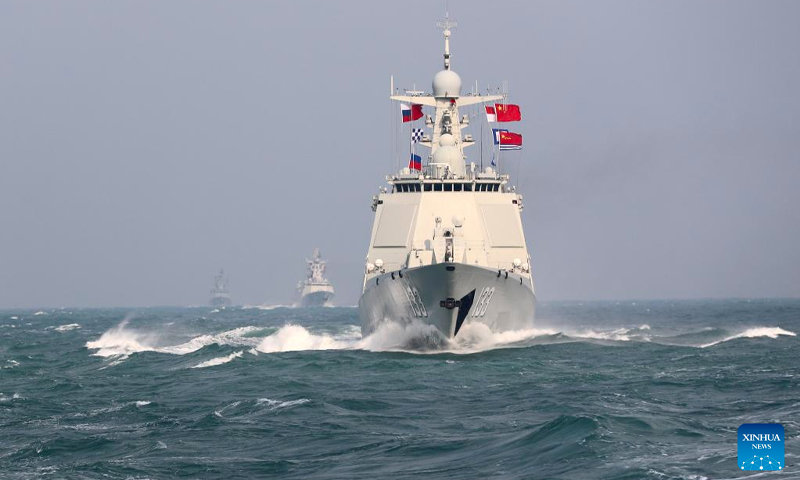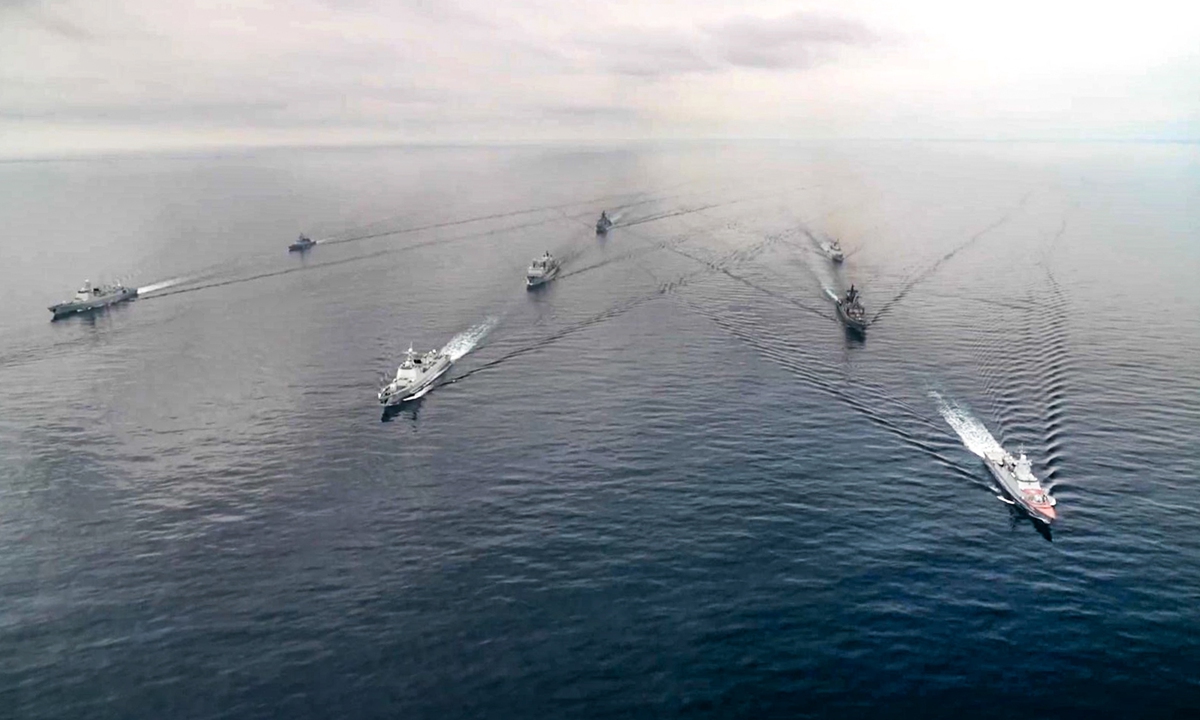
Warships of Chinese navy take part in a joint naval exercise, Joint Sea 2022, in the East China Sea on Dec 21, 2022. Chinese and Russian navies on Dec 21 kicked off a joint naval exercise, Joint Sea 2022, in the East China Sea. Photo: Xinhua
By Liu Xuanzun and Guo YuandanChina and Russia's third joint naval patrol that allegedly reached international waters near Alaska last week has touched the nerves of US media, which hyped the voyage as "highly provocative," ignoring the fact that the US constantly sends warships and warplanes to China's doorsteps for close-in reconnaissance and military exercises under the so-called freedom of navigation.
11 Chinese and Russian vessels approached the Aleutian Islands and have since left without entering US territorial waters, the Wall Street Journal (WSJ) reported on Sunday, citing US officials.
Four US destroyers and a P-8 maritime patrol aircraft shadowed the combined Chinese and Russian naval force, the report said.
While the WSJ report quoted a US Northern Command spokesperson who said the patrol remained in international waters and was not considered a threat, it also quoted US experts as saying the voyage "is a historical first" and "highly provocative."
The US media reports came after China's Ministry of National Defense announced on July 26 that China and Russia would soon launch their third joint naval patrol, which would see both sides' warships sail into West and North Pacific waters following the Northern/Interaction-2023 joint exercises in the Sea of Japan.
The operation is not targeted against any third party and is not related to any international or regional situation, the Chinese Defense Ministry said in a press release at the time.Two Type 052D guided missile destroyers, two Type 054A guided missile frigates and a Type 903 comprehensive replenishment ship of the Chinese Navy are included in the flotilla, while the Russian Navy is represented by vessels including large anti-submarine ships and corvettes, according to media reports.
The Northern/Interaction-2023 joint exercises and the subsequent joint naval patrol fully reflect the level of the strategic mutual trust between the two countries and further enhanced the traditional friendship between the Chinese and Russian militaries, said Senior Colonel Tan Kefei, a spokesperson at China's Defense Ministry, at a regular press conference on July 27.
China is willing to continue to boost pragmatic communication and cooperation with all parties and contribute positive forces in safeguarding regional peace and stability as well as deal with all kinds of security threats, Tan said.
Despite that China and Russia announced the joint patrol, US media are attempting to hype the "China and Russia threat" theory, Zhuo Hua, an international affairs expert at the School of International Relations and Diplomacy of Beijing Foreign Studies University, told the Global Times on Monday.
The China-Russia joint patrol in international waters in the North and West Pacific marks a positive force that helps safeguard regional stability and security of strategic routes in the Asia-Pacific region at a time when the US is enhancing combat readiness, rallying allies and partners in the region to change defense policies and expand militaries, which escalated regional tensions, Zhuo said.
'Not first, not last'

Vessels of the Russian and the Chinese navies take part in the joint naval and air drills North/Interaction-2023 in the Sea of Japan on July 21, 2023. The drills involve sea and air escorts, and repulsion of trespassing vessels from areas closed for navigation. Photo: VCG
This is not the "historical first" that a China-Russia joint naval patrol flotilla has reached waters off Alaska as US media has claimed, as a similar case took place during the second joint naval patrol between the two countries in September 2022.
At that time, only a lone US Coast Guard cutter was on the scene, compared to the USS John S. McCain, the USS Benfold,the USS John Finnand the USS Chung-Hoondestroyers and a P-8 maritime patrol aircraft deployed this time, the WSJ said.
The US media linked such an escalation in US reaction to the Ukraine crisis and the Taiwan question, but such speculation is purely groundless and is aimed at throwing mud at the normal military cooperation between China and Russia, analysts said, noting US' hegemonic mindset and its double standard are the true reasons behind its anxiety.
The international waters in the North Pacific including the Bering Sea are important because from here ships can access the Arctic, Fu Qianshao, a Chinese military expert, told the Global Times on Monday.
With the global warming, the Arctic shipping routes could become key passages for civilian ships to carry out commercial activities, Fu said.
While the joint patrols by China and Russia aim to safeguard the security of key strategic routes, the US wants to control the passages out of its hegemonic mindset, experts said.
The US is nervous because the Bering Sea is close to Alaska, but the US should not forget that it frequently sends warships and warplanes to other countries' doorsteps for so-called freedom of navigation operations, including to the South China Sea and the Taiwan Straits, sometimes alone and sometimes together with other countries' forces, Fu said.
While the China-Russia joint flotilla did not enter US territorial waters, US warships have in many occasions trespassed into Chinese territorial waters in the South China Sea.
It is ironic that all US forces involved in shadowing the China-Russia joint flotilla have provoked China on Chinese doorsteps, observers said. The USS John S. McCain, the USS Benfold,the USS John Finnand the USS Chung-Hoondestroyers and a P-8 maritime patrol aircraft have all made transits in the Taiwan Straits in the past, while the USS John S. McCain, the USS Benfold and the USS Chung-Hoonhave records of being expelled after trespassing into Chinese territorial waters in the South China Sea.
It exposes the US' double standard that only allows its military presence near other countries and not accepts other countries' military presence near it, observers said, urging the US to reflect on itself.
From a military perspective, the four US destroyers and a US patrol aircraft could only monitor the China-Russia joint flotilla of 11 warships, and were not capable of doing anything more than that, analysts said.
"In the future, the Chinese Navy could conduct more far sea patrols like this, either alone or together with other countries. The Americans should get use to it," Fu said.
Before the China-Russia joint naval patrols, Chinese naval warships had already reached international waters near Alaska.
Once such case was in August 2021, in which a four-ship Chinese naval flotilla led by a Type 055 10,000 ton-class large destroyer was reportedly spotted by the US Coast Guard in the US Exclusive Economic Zone, off the coast of the Aleutian Islands in Alaska.
In 2015, five PLA Navy ships transited expeditiously and continuously through the Aleutian Island chain in a manner consistent with international law, the US Naval Institute News reported at the time. It was an "innocent passage" within 12 nautical miles of the Aleutian Islands, the report said.
Chinese experts said this kind of far sea exercise serves as a countermeasure and a signal against the US hegemonic actions of frequently making provocations near China in the name of freedom of navigation.













